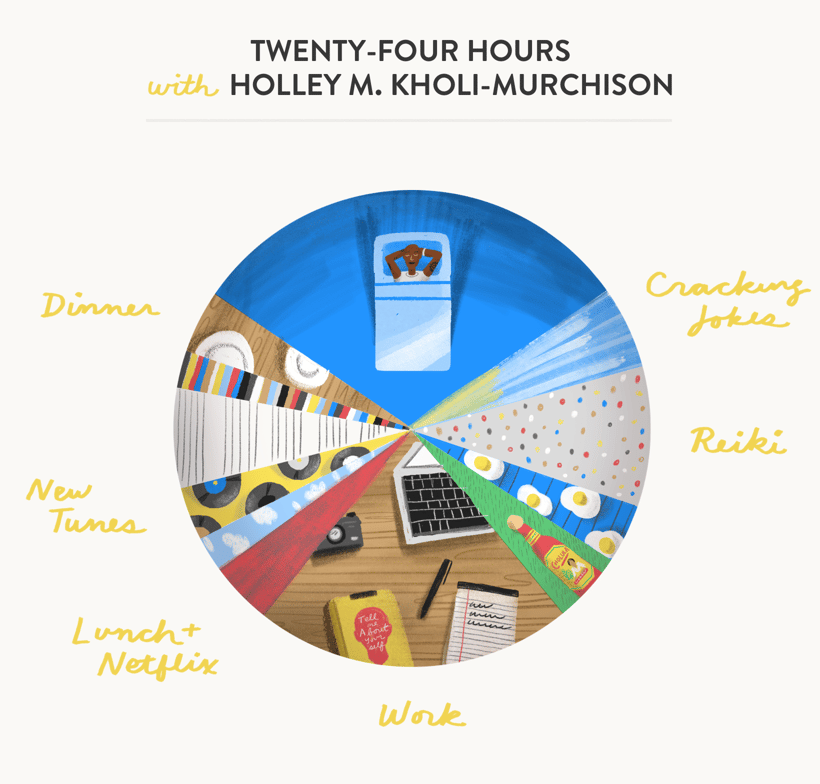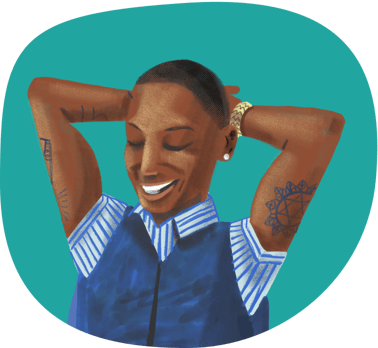Introductions are brief yet valuable moments for connection in which we can tell the stories of our work and our lives, in a compelling and heart-centered way. But in the era of multi-hyphenates, it’s not always easy to talk about what we do. Here’s where Holley comes in.
Holley M. Kholi-Murchison is the author of Tell Me About Yourself, a book designed to bolster confidence and authentic communication in life’s most vulnerable moments. She’s also an entrepreneur, wife, founder, storyteller, advisor, and educator.
We spoke with Holley about the positive ripple effects of making thoughtful introductions and the importance of owning our narratives.
Holley, as someone who wears a lot of hats, how would you describe your relationship with time?
I grew up playing basketball competitively, so how I’ve come to know and experience time — as well as the practice of wearing a lot of hats — was shaped by my experience on the court. Because there’s a set amount of time in each quarter, it mattered that every second was used wisely. When I showed up — as captain, power forward, defender, rebounder, scorer, shot blocker, post player, screen setter, cheerleader, charge taker, or whatever was required at any given moment of the game — I knew that whether we won or lost where I was in time and space counted for something.
Similar to basketball, in my life, I feel like I’m in a constant state of movement and transition, so my relationship with time is ever-changing. I think about time as a gift that allows me to reflect deeply and intentionally about how and where I’m taking up space, dedicating energy and presence to what is (or isn’t) important to me, and measuring how in tune I am with the world around me.
“I think about time as a gift that allows me to reflect deeply and intentionally about how and where I’m taking up space, dedicate energy and presence to what is (or isn’t) important to me, and measure how in tune I am with the world around me.”
You’ve helped thousands of people define themselves effectively and articulately with your method, the Tell Me About Yourself enquiry. Why is this skill so crucial to an individual’s or a team’s success?
The foundation of our relationships is rooted in how we communicate with ourselves and each other. Introductions are usually the first opportunity we have to make a lasting impression that jumpstarts those relationships. In day-to-day conversations that can accelerate or impede our progress, we’re frequently required to discuss ourselves, to share who we are and what we contribute to the world. Unfortunately, in most circumstances — especially when we have just a moment’s notice to respond — it can be challenging to pull all the pieces together to convey the perfect response, while forging a bond, sparking an idea, or advancing into deeper, more meaningful conversation.
Once we commit to practicing and mastering that skill, what’s available to us (and our teams) is heightened creative confidence and the capacity to externally share a company’s story or mission through a more human lens. We also gain the ability to engage and motivate people at all levels to champion and execute ideas, and deepen connections and synergy that improve collective performance.
In your experience, how does time impact the way we talk about ourselves? How often do you recommend we revisit the narrative we choose for ourselves?
I recommend revisiting the Tell Me About Yourself enquiry and taking inventory at least once a month. Because we are humans who contain multitudes, our stories aren’t static. They’re changing as rapidly as we are.
Choosing legacy over currency seems to be a priority and theme in your purpose-driven work. At the same time, being paid for the value your businesses bring is important on a day-to-day level. How do you make sure both goals are met? Is it hard to toggle between the long-term and the short-term perspective when running a business?
For me, the two perspectives work hand-in-hand in both principle and practice. The choosing of legacy over currency is a dual commitment to:
- Never compromise my values or purpose for the sake of a dollar.
- Intentionally seeking out clients and partners who care about legacy as much as we do, honor and understand the true value (long and short term) of a purpose-driven and human-centered approach, and put their money where their mouth is.
What are your favorite ways to slow down time and recenter yourself?
My top three:
- Music is my immediate go-to. There’s a song called "Love Is the Message" by jazz percussionist Yussef Dayes featuring Alfa Mist and Mansur Brown. They’re brilliant musicians. I listen to it multiple times a day — while I’m on walks, when I’m cooking, as a meditation, before I go on stage to speak or present to a new client. It’s a 7-minute sonic journey and one of the most beautifully grounding things I’ve ever heard.
- Cooking! I travel about 30% of the year for work and trying new foods when I’m visiting different countries is a blessing and unifying experience that I’m truly grateful for. When I’m home, I feel really grounded and at peace when I’m able to cook for my family
- Going to the movies with my wife. We love to geek out over film and cinematography and when I’m not traveling, we go to the movies together about once a week. It’s our happy place.
These practices remind me that the point of it all is not to exhaust myself trying to build a body of work that eclipses my life, but to create a heart-centered body of work. A body of work that embodies the fun, joy, and richness that I wish to cultivate in my life as a whole while helping others do the same.
“The point of it all is not to exhaust myself trying to build a body of work that eclipses my life, but to create a heart-centered body of work.”
You’re a champion of social justice causes and personal transformations that often don’t have a defined timeline or end date. How do you approach projects like this, and how do you ensure that your focus and energy are sustained in the long term?
A mentor in high school offered me the most sage advice that I’m always working on implementing: “Just make sure your eyes aren’t bigger than your stomach.”
With social justice causes and personal transformations, it’s easy to get caught up in the bigness of it all, but the reality is, no single person is responsible for creating all of the change that the world needs. It’s a collective effort. I approach these types of projects with that understanding, and an acknowledgment that they’re one part of a larger mission to achieve global equity.
Though we don’t know how long that will take, the efforts we’re making to chip away can be time-bound, and I do my best to sign onto measurable projects that have a start and end date.
“The reality is no single person is responsible for creating all of the change that the world needs. It’s a collective effort.”
What strategies have worked for you in determining when to say “no” and when to say “yes?”
There’s a set of guiding questions I ask myself before saying yes or no:
- Am I genuinely moved by or excited about the opportunity?
- Do I have the capacity to give it my best?
- Is it in alignment with one or more of the impact areas (shift, space, sustenance) we focus on at Holi. Brands?
- Will it bring us closer to or benefit communities we want to serve?
- How does it contribute to the revenue goals of our businesses?
What’s one non-negotiable thing you always make space for in your life? What’s something you’d like to do less of?
Non-negotiable: Reiki. It is a practice that energetically readies my mind, body, and spirit for the day. When I don’t do it, I can literally feel how out of sync I am.
Do less of: Aimless Instagram scrolling (for obvious reasons)!
Did you have any rituals growing up that you’ve cherished and carried with you?
Singing and songwriting. Since I was a kid I’ve always created melodies and written songs to express my emotions and stretch my creativity.
What makes you feel like you’ve spent your time well?
When I’ve found harmony between time spent with myself, loved ones, work, and play. It isn’t always evenly distributed, but these are the areas that are most important to me, so when they all get significant attention in a given week, I feel like I’ve spent my time well.
In the words of the great Sade, cherish the day.
Imagine you’re reflecting at the end of a day or other period of time where you felt that your time was well spent. What did you do? How did it feel? How much time did you spend doing it?
- Sleep. (7 - 8 hours)
- Cracking jokes and planning the day in the shower with my wife. (30 minutes, morning)
- Reiki session. (1 hour to 90 minutes, morning)
- Breakfast. (30 minutes, morning)
- Neighborhood walk with my dogs Cholula and Parker. (30 minutes, morning)
- Meetings, emails, coaching, and strategy sessions from home. (5 hours, midmorning to afternoon)
- Lunch and Netflix with my wife. (1 hour, late afternoon)
- Solo walking meditation. (30 minutes, early evening)
- Visiting the listening room at EMBER Audio + Design. (1 hour, early evening)
- Listening to a new or fave album or playlist on repeat. (2 hours, evening)
- Reading a good book. (30 minutes, late evening)
- Cooking dinner and catching up with my wife. (1 hour, late evening)













